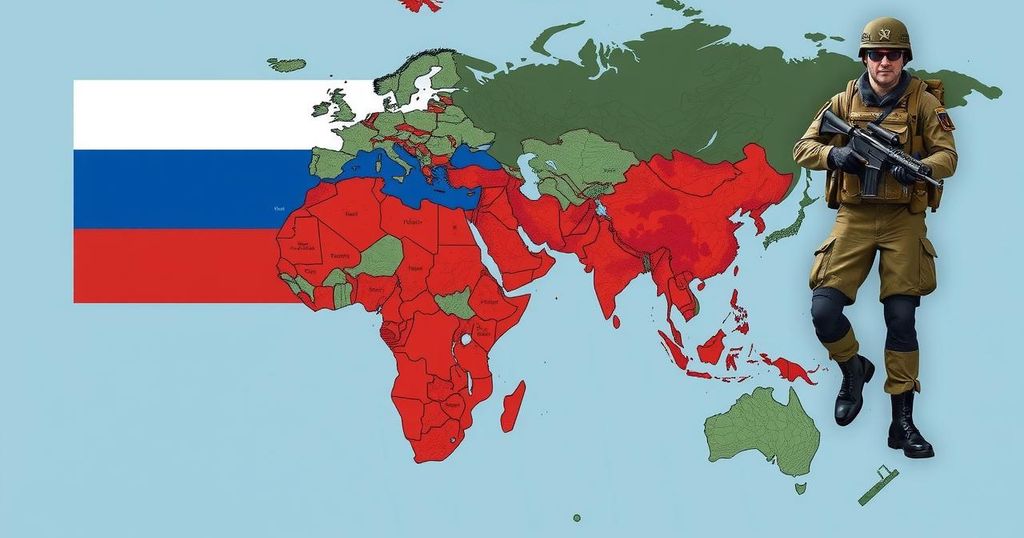The Collapse of Russian Security Influence in Africa Following Syrian Turmoil
The downfall of Bashar al-Assad in Syria has critically undermined Russia’s influence in Africa by exposing its military vulnerabilities and logistical dependencies. Following military withdrawals from Syria, Russia’s capacity to project power in Africa is increasingly questioned, harming its partnerships and economic ties. As Moscow reassesses its strategy, the loss of operational bases challenges its credibility as a security provider in the region, leading to uncertainties about its future role in Africa.
The recent events in Syria have critically undermined Russia’s perceived influence and security capabilities across Africa. Following the downfall of Syrian President Bashar al-Assad, Russia’s aspirations for great-power status have suffered a significant setback. The Kremlin’s military overstretch, particularly in Ukraine, coupled with intelligence failures during the offensive led by Hayat Tahrir al-Sham (HTS), rendered Russia unable to support its principal ally in the Middle East effectively.
Consequently, Russia is on the verge of losing important military facilities in Syria, specifically the Tartus naval base and Khmeimim air base. Recent satellite imagery suggests a considerable evacuation of Russian military personnel and equipment from these bases, with expectations of a complete withdrawal by February 2025. These developments not only alter President Vladimir Putin’s foreign-policy narrative but may also erode Russia’s standing and influence in Africa, as Moscow grapples with restoring its strategic posture.
The Kremlin’s reluctance to send additional troops to Syria underscores its prioritization of Africa. However, the loss of Tartus could disrupt logistical efforts crucial for aiding military operations across the continent. Russia had leveraged the model developed in Syria for military assistance in various African nations, which underscored its effectiveness as a security partner. Such credibility is now severely compromised as regional leaders begin to question Moscow’s reliability in crisis situations.
Historically, Russia’s military involvement in Syria benefited its interests in Libya, supplying weapons and forming valuable partnerships. Russian mercenaries, notably linked to the Wagner Group, had established escalated operations in North Africa, and this was facilitated through facilities in Syria. The failure to maintain this network could diminish Moscow’s capacity to project power effectively within Africa.
The crisis in Sudan further exemplifies the interconnectedness of Russia’s interests in Syria and Africa, illustrating a potential decline in military support and commerce that has become vital for the Kremlin’s finances. Moscow’s reliance on mineral resources from African nations has been strategically crucial, particularly in sustaining its economy amid ongoing conflict in Ukraine.
Engagement with the newly established authorities in Syria is essential for Russia to retain its foothold. The Kremlin’s strategy appears centered around negotiating access to military bases, which could potentially bolster its operations in Africa. However, without substantial changes in Assad’s regime and relations with HTS, broader opportunities may remain limited. Any shift of operational facilities to Libya or Sudan raises logistical challenges and uncertainty regarding regional collaborations.
Ultimately, the fallout from these events has painted a grim picture regarding Russia’s capabilities as a security provider within Africa, prompting a reassessment of its geopolitical strategy. The current challenges are indicative of a greater struggle for Russia to maintain its influence while acknowledging severe limitations on its power exertion. Despite this, the Kremlin may explore alternative methods to sustain its partnerships by aligning with key African leaders to encourage cooperation based on mutual interests in addressing regional instability.
Russia’s entanglement in the Syrian conflict has historically bolstered its claims as a great power, allowing it to project military influence in the Middle East and ensure pivotal partnerships elsewhere. However, significant setbacks in Syria have inadvertently revealed vulnerabilities that jeopardize Russia’s standing in Africa, as Moscow attempts to respond to both conflict dynamics and external pressure from Western nations. The implications of its military operations and the logistical links established across these regions are paramount in understanding the evolving geopolitical landscape.
The precarious situation following the loss of power in Syria significantly threatens Russia’s perceived supremacy and operational capabilities in Africa. The interplay of military engagements, allied partnerships, and logistical sustainment are essential aspects of Russia’s strategy that are now in disarray. The Kremlin faces pressing challenges that could reshape its diplomatic connections on the continent as regional partners deliberate their ties with Moscow amidst these disconcerting developments.
Original Source: foreignpolicy.com




Post Comment